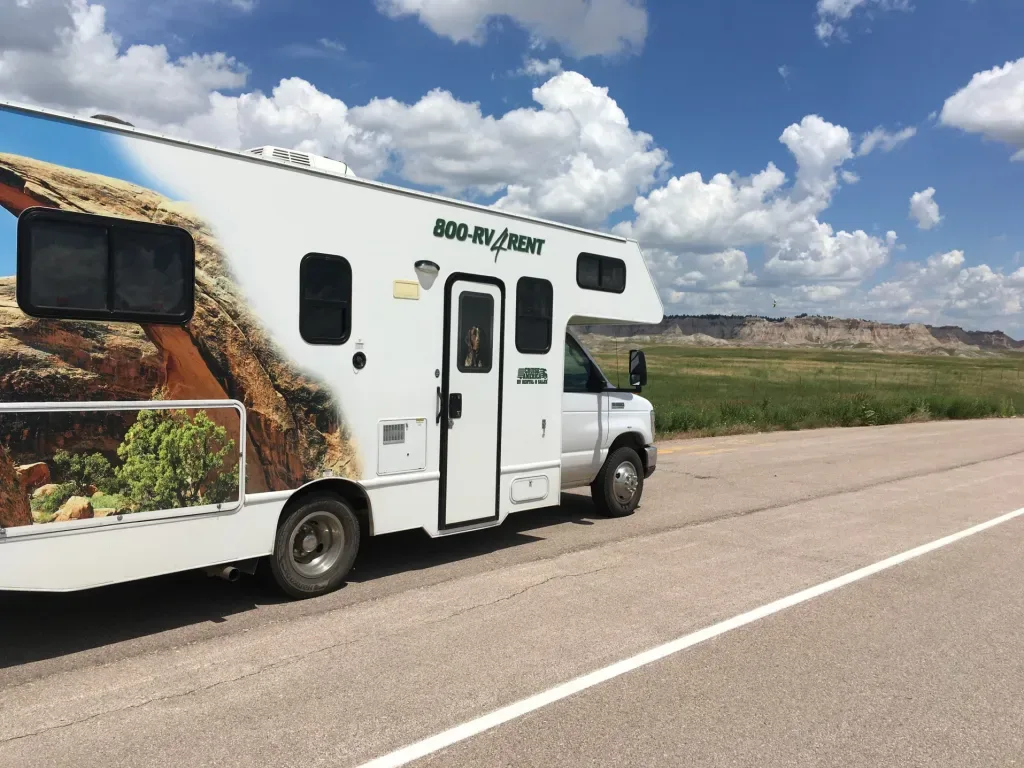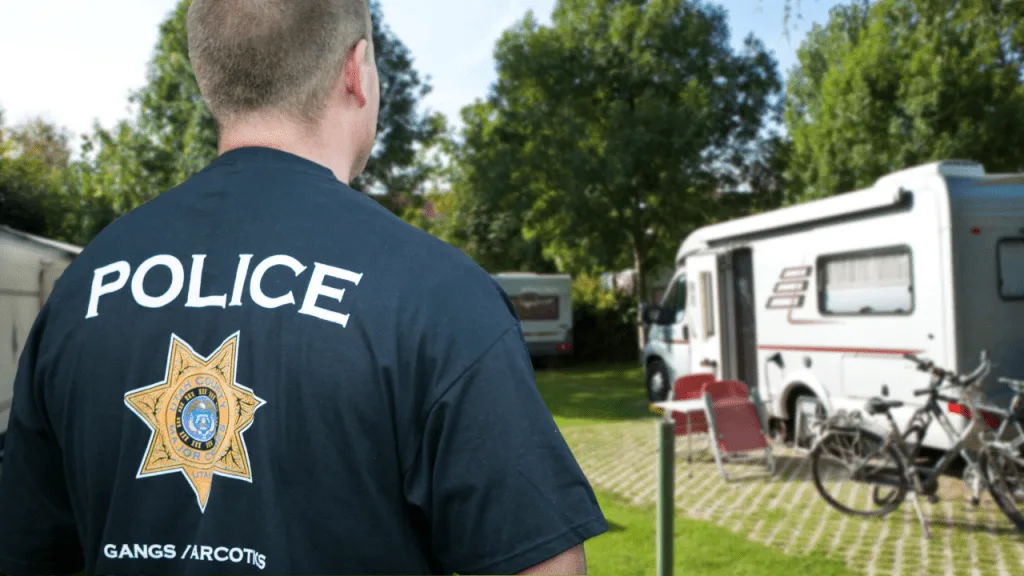RVing can provide a tremendous amount of freedom and privacy. Many RVers even enjoy finding remote places to camp to distance themselves from civilization.
However, we’ve seen and heard reports of RVers experiencing harassment while on the road. You can escalate or deescalate the situation depending on how you handle yourself.
The situations can ruin your day or even your entire trip. We want you to be aware of the possibilities so you can respond appropriately.
Today, we’re looking at five common ways RVers get harassed.
Is It Common for RVers to Get Harassed?
Many RVers log thousands of miles a year traveling and experience no issues regarding harassment. However, other RVers may feel like they’re a magnet for harassment and frequently have problems. In general, experiencing harassment while RVing is relatively rare for most RVers.
Someone frequently experiencing harassment while RVing may not realize they may be part of the problem. How they drive, maintain their campsite, or behave might have something to do with it.

On the other hand, there have been some innocent RVers who have experienced harassment during their adventures. While you can’t control every situation, you can avoid making yourself an easy target.
Here Are 5 Ways RVers Are Harassed on the Road
There are often a few common factors when we hear about RVers experiencing harassment on the road. Here are five.
1. Truck Drivers Getting Frustrated You’re in Their Way
Many RVers join fuel savings programs to use the truck lanes at fuel stations. However, these are the lanes that professional drivers use to fill up their big rigs. There have been many instances where inattentive drivers have caused issues for truck drivers trying to do their jobs.
If you choose to use these pumps or stop at truck stops, it’s essential to make sure you’re not parking in the way of 18-wheelers at work.
Truck drivers can drive several hundred miles day after day. They spend the majority of their day in the cab of their truck. It’s not an easy job, and getting in their way can lead to a tense situation. They may not be as patient or kind as you like if you’re in their way or causing delays in their travels.

2. Getting Pulled Over by the Cops for No Reason
While many drivers state that law enforcement pulls them over for no reason, there typically is one. Speeding, driving too close, or failing to use your turn signal, are all reasons a police officer could pull you over.
How you respond to an officer stopping you can typically determine the trajectory of the stop. In most cases, being respectful and patient can go a long way.
If you want to avoid getting pulled over “for no reason,” it’s important that you follow all traffic laws and make sure your equipment is working appropriately. Check your lights and turn signals before each trip and make sure you’re following all rules and regulations for towing.
3. Having Other Drivers Mad That You’re Blocking Traffic
We’re seeing some massively long RVs rolling through campgrounds. One of the easiest ways to anger other drivers is to block traffic. Maneuvering these massive rigs takes a tremendous amount of space. If you find yourself stuck in a situation, don’t expect to win fans from those sitting in traffic.
You must research your route when RVing. Taking your big rig down a road that’s not big-rig friendly can not only cause damage to your vehicle and the property of others around you, but it can cause massive delays.
We’ve seen RVers have to back down an entire city block because of a low clearance bridge. Using an RV-safe GPS or researching the route in advance would have prevented the situation.

4. Other People Assuming You’re Homeless Because You Have an RV
People make a lot of assumptions about RVers, one of which is that they’re homeless. Even if you’re a full-time RVer, you may be houseless but not homeless. You can often avoid this by keeping your RV looking presentable and maintained. This is more likely to occur when boondocking or staying overnight in a parking lot.
Some RVers have received harassment from individuals who disagree with them camping in a specific spot. A business might permit you to stay, but a local community member may disagree. There have been instances of community members bothering RVers and telling them to go on their way.
This is why you must limit your stay to a single night in these locations and minimize the amount of time you spend in the parking lot. Don’t be afraid to contact local authorities if you find someone harassing you.
5. Cops Pulling You Over for Being Overweight
Both your vehicle and RV have a maximum capacity when it comes to weight. Adding too much to them can be very dangerous. Some officers carry mobile scales allowing them to weigh trailers.
The likelihood of an officer pulling you over for being overweight isn’t very high unless you’re obviously overweight.
A massively sagging rear end of your vehicle will be an obvious sign to officers that you’re overweight. Keeping your RV underweight keeps you safe and on the right side of the law.

What to Do When You Get Pulled Over
How you respond when getting pulled over is very important. First, find a safe place to pull over to avoid any issues for you or law enforcement. You should remain calm and keep your hands visible at all times. If you’re pulled over at night, it’s good to turn on your dome light so the officers can see inside your vehicle as they approach.
Wait until law enforcement arrives at the vehicle to reach for your documents or identification. Officers will typically inform you why they are stopping you when they approach your vehicle. Give them your attention and maintain control of your temper and attitude.
If you feel that law enforcement is treating you inappropriately, you can ask to speak to a supervisor. In some cases, it can be helpful to record the interaction.
However, you should remember that your recording won’t be of much help if you escalated the situation or weren’t cooperative with the officers.
What to Do If You Get Harassed on the Road
If you’re getting harassed while on the road, do whatever you can to deescalate the situation. Even if you’re not doing anything wrong, you have to pick and choose your battles.
Allow the person to say what they need to and look for an exit. Don’t be afraid to get park rangers or the police involved. Figures of authority can often diffuse situations and help resolve a problem.
Your safety is the most important thing to consider in any situation. If you don’t feel safe, leave if possible. This may be inconvenient and mean packing up your stuff and moving on your way or leaving your campsite for the night. Being safe is better than “winning” any confrontation.
Tips for Staying Safe While RVing
You can do a few things to maximize your safety while RVing. While you can’t eliminate all risks, you can help ensure you’re as safe as possible during your adventures. Let’s take a look!
Obey All Driving and Traffic Laws and Weight Limits
You can’t complain that a police officer stops you if you’re violating the law. It’s kind of their job to enforce the law. You have to know the rules of the road where you’re traveling. Maximum speed limits vary greatly from state to state. Some states, like California, have a maximum speed limit specifically for vehicles towing trailers.
You also want to know the weight limits of roads and bridges, especially if you’re in a heftier motorhome or towing a toy hauler. Violating the weight limits can cause increased wear and tear on the road. That’s reason enough for law enforcement to stop you.
Know Your Rights
You must brush up on the laws regarding searches and your interactions with police. The requirements for an officer to search your RV vary based on how and where you’re using it. However, if you’re crossing international borders, they typically can search your entire vehicle without your permission.
In general, officers will only search a vehicle without a warrant if they have probable cause to do so or when arresting the driver or ceasing the vehicle. An officer can request to search it without probable cause, but the driver doesn’t have to permit them. An officer can’t search your vehicle without a warrant, probable cause, or the owner’s permission.
Weigh Your RV Before Hitting the Road
One of the biggest mistakes many RVers make is not weighing their RVs before hitting the road. Overloading your RV can cause increased wear and tear on the RV’s suspension and tires. Depending on the weight distribution, it can cause handling issues while towing down the highway. A significant amount of weight on the rear of the RV can cause dangerous sway at higher speeds.
It’s a good idea to drive your RV across a CAT scale once you get fully loaded with all of your camping gear and your passengers.
This will help ensure you stay within your vehicle’s towing capabilities. Too much weight on your vehicle’s rear axle can reduce the amount of traction on the front end of your vehicle and cause reduced control for steering.
Check Your Tires Before Leaving and Throughout Your Trip
A tire failure while towing can be very dangerous and cause tremendous damage to your rig. We strongly suggest that you check your tires before every trip. This includes inspecting them for any abnormal wear and their pressure levels. You’ll find the maximum PSI for the tires on their sidewalls and on the tire and loading information sticker, which is typically on the front, driver-side of the RV.
We highly recommend using a Tire Pressure Monitoring System (TPMS) while traveling.
This can help you keep an eye on both the pressure and temperature of your tires. If you do experience a change, these systems can alert you instantly, which helps reduce the amount of damage to your rig and keeps you safe.
Be Aware of Drivers Around You
When you’re towing or driving an RV down the highway, you must know what’s happening around you. Avoid making lane changes in traffic as RVs often have large blind spots that make it difficult to see others. Investing in towing mirrors or cameras that minimize the blind spots can be helpful.
Avoid distractions while driving too. Your focus should be on the road and what’s going on around your RV. Give passengers control of the radio and the task of assisting you with directions and navigation. Distracted driving can be hazardous, especially when driving or towing several tons of additional weight in unfamiliar areas.
Be Respectful and Use Reason If You Face Problems While RVing
If you want to avoid getting harassed while on the road, make sure you obey the law and be considerate and respectful of others. How you handle yourself in these situations can play a significant role in the outcome. Avoid upsetting others by following the law. Safety is of the utmost importance anytime you’re driving, especially while RVing.
If you’re respectful and use reason during a confrontation, you’ll likely find that you can deescalate the situation quickly. Understanding the other person’s frustrations can be difficult and sometimes impossible, but it’s the best way to resolve a problem.
Have you ever experienced harassment while RVing?
Discover the Best Free Camping Across the USA
To be honest with you, we hate paying for camping. There are so many free campsites in America (with complete privacy).
You should give it a try!
As a matter of fact, these free campsites are yours. Every time you pay federal taxes, you’re contributing to these lands.
Become a FREE CAMPING INSIDER and join the 100,000 campers who love to score the best site!
We’ll send you the 50 Best Free Campsites in the USA (one per state). Access the list by submitting your email below: